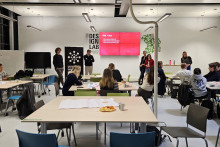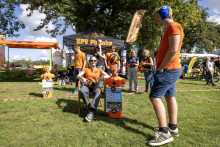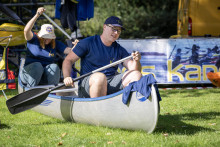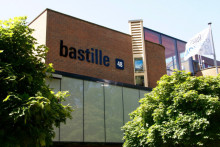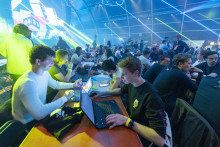The event, which was attended by around twenty students, followed a survey among UT students. According to organiser Fran Karlovic, the aim of the session was twofold: ‘We want to think together about causes and solutions and hope that participants form working groups to further develop these ideas. Although the UIF and SU will provide support, the responsibility after today lies with the students themselves. That does require a certain degree of altruism, yes.’
Student engagement
Karlovic emphasised that the term ‘student engagement’ is preferred over ‘student activism’, to make clear the difference between active and activist students. The survey that led to the meeting yielded valuable insights, according to Karlovic, despite an expected 'sampling problem'. Because although the response from more than five hundred students was considerable, it turned out that the already active group responded the most, according to Karlovic.
Meta-activists
The UIF coordinator shared the results of the survey at the start of the session. 85 percent of the answers came from active students, but even within this group, lack of time and financial obstacles emerged as the biggest hindrances. Remarkably, eighty respondents indicated that engagement ‘seems fun’ but at the same time were 'not interested', and that the students estimated their own motives to be a lot more altruistic than when asked about those of their friends. In addition, seventy participants indicated that they were interested in thinking about and working on solutions. Of these 'meta-activists', about twenty eventually joined the think tank.
When asked whether other universities are also experiencing a trend of declining engagement, SU chair Annick Bijlsma replied that this is partly the case, but that the UT has a high association-to-student ratio. ‘As a result, we are more likely to experience declining engagement than other cities. That is a shame, because the active nature of the UT is one of our strengths.’

Post-its and mind maps
After the plenary introduction, the participants started brainstorming in groups of four students. Each table was given a specific ‘target group’ to come up with solutions for. For example, what can be done for students who want to become active in order to meet new people, but refrain due to financial worries? The groups got busy with post-its and mind maps, and the varied backgrounds of the participants quickly led to interesting conversations and lines of thought. For example, at a table next to someone from the Student Union, you would also find active students from volleyball club Harambee, LGBTQ+ association Exaltio, the University Council and investment association Duitenberg.
‘Don’t get stuck in a committee’
An unofficial delegation of no fewer than four members from Duitenberg was present. Chairman Sebastiaan Visscher did not fill in the survey himself, but was happy to explain why he joined the session: ‘At Duitenberg, we have also noticed that some committees have been difficult to fill recently, even though we do not have fewer members. New members often say: ‘If you need help, just ask, but I don’t want to get stuck in a committee.’ This session is therefore also an opportunity for us to gain inspiration. I think that an important part of the solution is to show that a committee can be combined well with other pursuits.’
From ‘mini-traineeship’ to free coffee
After twenty minutes of brainstorming, the five groups presented their ideas, tailored to their target group. The participants agreed on one thing: the benefits of engagement should be highlighted more prominently, so that interested parties see their efforts and potential costs as an investment, rather than an obstacle. Because most of the given target groups had a financial hindrance, most of the results also had a financial outlook. For example, a group with two Duitenbergers came up with the idea of having companies hire active students as working students, who they also pay for their activism work, as a ‘mini-traineeship’. Suggestions were also made for free coffee and printing credit for active students, financial support from the municipality and the appointment of financial advisors within associations.
Getting started yourself
After the brainstorming sessions, the participants discussed in new group compositions how their ideas could be actionized. Karlovic concluded the evening with an appeal to the participants: ‘From now on, it is up to you to continue independently. We hope that this meeting is the start of initiatives that can turn the tide.’ Despite a slightly lower turnout than expected, Karlovic spoke of a successful session after its one-and-a-half-hour duration. ‘I think that we have come up with good ideas with this group, just look at how the participants are still talking now. I look forward to further developments.’


